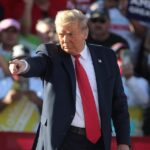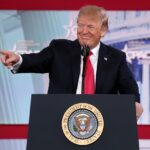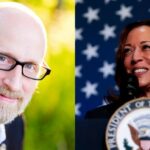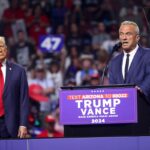By Jonathon Van Maren
As Year One of the Trump Administration draws to a close, the predictable report cards are coming in. Progressives are predicting he’ll implode or be impeached and paint his first year as an unmitigated disaster, maintaining the shrill tone they inaugurated during his candidacy. Most conservatives see his presidency so far as a mixed bag, with the president’s social media buffoonery and thin-skinned nature competing with some genuinely good policy decisions and judicial appointments. There has been a large staff turnover, as well—and the two primary factions of the year-old administration are becoming more defined.
The Trump Administration is now largely divided between social conservatives, represented by Vice President Mike Pence, and those of a socially liberal bent. Everyone recognizes that the social conservatives play a fundamental role that cannot be ignored. Even Steve Bannon, the former Trump advisor and bombastic Breitbart boss, admits bluntly that Mike Pence, a devout evangelical, brought in the base in for Trump. “Trump’s got the populist nationalists,” the New Yorker quoted Bannon as saying in a recent Pence profile, “but Pence is the base. Without Pence, you don’t win.”
Many have wondered how Donald Trump, an unrepentant serial adulterer who is obviously illiterate in the ways of American evangelicalism, managed to garner a higher percentage of the evangelical vote than the squeaky-clean Mitt Romney. Commentators have pointed with glee to evidence that Trump finds the religiosity of Mike Pence and his fellow Christians rather humorous, including anecdotes in the Pence New Yorker profile that recounted Trump stopping people after they’d left Pence’s office and asking them, “Did Mike make you pray?” When a legal scholar told Trump and Pence that if the Supreme Court overturned Roe v. Wade, abortion would still remain legal in many states, Trump reportedly turned to Pence and said, “You see? You’ve wasted all this time and energy on it, and it’s not going to end abortion anyway.”
But to see these comments as ridicule or animosity towards Christians—as many in the commentariat apparently do—is to miss the point. Trump does not understand Christians and social conservatives, but he has genuinely worked very hard to gain their political support—efforts which paid off enormously for him in the 2016 election. His meetings with social conservative leaders and his commitments to pursue their priorities are described brilliantly in Stephen Mansfield’s latest book Choosing Donald Trump: God, Anger, Hope, and Why Christian Conservatives Supported Him. Mike Pence, incidentally, is one of the few members of the Trump Administration that Trump has not battled with and has not criticized publicly—nearly all of the “populist nationalists,” on the other hand, including Sebastian Gorka and Steve Bannon, are gone.
Even many sceptical social conservatives have been surprised at the lengths Trump has gone to keep his promises. He has defunded abortion overseas, made dozens of originalist judicial appointments, nominated Neil Gorsuch to the Supreme Court, withdrew funding from the UN Population Fund, appointed dozens of rock-ribbed pro-lifers to prominent administration positions, inserted language recognizing the humanity of pre-born children into various government documents, and even referred to a pro-choice politician as “pro-abortion.” After Trump met with several Democratic leaders earlier this fall, he convened with several evangelical leaders at the White House in September to reassure them. “The Christians know all the things I’m doing for them, right?” the New York Times quoted him as saying to those present.
The social liberal elements in the Trump Administration, on the other hand, are most powerfully represented by the president’s daughter and son-in-law, Ivanka and Jared Kushner. The Kushner family are longstanding Democrat powerbrokers, and Jared has rapidly become the president’s go-to man on nearly every file. His office is physically the closest to Trump’s. Ivanka, of course, has an undefined and broad role within the administration that allows her to give her advice to her father on issues as they come up, and insiders say that her influence is enormous.
Despite the fact that the young power couple are Orthodox Jews—Ivanka converted in order to marry Jared—they have done their best to pull the Trump Administration away from socially conservative policies. The long hoped-for presidential executive order on religious liberty earlier this year, for example, was nearly completely gutted of the protections social conservatives were hoping for—and nearly every media outlet reported that the Kushners had convinced Trump not to sign the original. The Kushners are very supportive of the LGBTQ movement, and do their best to signal that support whenever they can: NBC reported that the power couple are “using their clout and charm to push their own socially liberal but fiscally conservative agenda.”
On the issue of abortion, Ivanka has been coy, refusing to say directly whether she is pro-life or pro-abortion. During the campaign, when Boston radio host Margery Eagan asked her pointedly what her position was, Ivanka responded by saying, “I don’t talk about my politics. I don’t feel like it’s my role, and not the candidate’s. I’m the daughter…I don’t think my politics are relevant to the discussion.” Prior to the Trump family’s entry into politics, Ivanka had said that, “I do label myself a feminist, and I do think of that in broad terms”—and she and Jared had donated cash to an organization that supported abortion. Obviously, the New York circles the Kushners run in are also very pro-abortion—they were spotted at a party in the Hamptons in July, along with Steven Spielberg, George Soros, and Chuck Schumer. But for the rest, Ivanka has made no on-the-record statements—something abortion activists find very frustrating.
One indication of where Ivanka’s sympathy might lie is her meeting with Planned Parenthood CEO Cecile Richards earlier this year. According to the New York Times, she pushed her father to offer the abortion giant a deal: Stop performing abortions, and you’ll keep your funding. Richards, of course, turned the offer down cold, snapping back that, “We will always stand for women’s ability to make decisions about their health and lives without interference from politicians in Washington, D.C.” Since then, she has rewarded Ivanka for her attempts at conciliation by blasting her for her “silence”—much to the relief of social conservative activists. The Trump family is not known for forgiving and forgetting when they become the subject of verbal abuse.
Where Ivanka’s influence is particularly detrimental to social conservatives is her growing relationship with liberal leaders such as Canada’s Justin Trudeau, who holds impeccable progressive credentials and spends much time promoting abortion “rights” around the world, most recently pushing the Irish prime minister to legalize abortion. In March, she attended a musical with Trudeau, and the Internet exploded over photos appearing to show Ivanka smitten with the young leader the month before. Donald Trump has since said publicly that he believes Justin Trudeau is doing a “great job” in Canada, despite the fact that on nearly every issue—from the Paris Climate Agreement to the global abortion industry—their governments are diametrically opposed.
The Trump Administration’s conservative positions on a wide range of issues have resulted in anger directed at the Kushners by their former friends in the New York elite and other liberals who feel that they should be able to do far more to shape the Trump agenda. Politico cited the transgender military ban, which Ivanka apparently found out about (as did many other administration officials) from her father’s Twitter account, as evidence of “a White House war between New York City liberals and traditionalist conservatives.” The influence of the Kushners, while large and powerful, has not been enough to derail all of the socially conservative initiatives launched by other members of the administration. As a result, the Kushners are losing so many friends that Jared has been referring to it as an “exfoliation,” noting that he is seeing “friendships break in the wind.” Nonetheless, the power couple still attempts to offer reassurance that behind the scenes, they are doing whatever they can.
The impact of the Trump Administration over the next several years depends, in part, on who wins this war of influence between “New York City liberals and traditionalist conservatives.” If President Trump has the opportunity to appoint one more Supreme Court justice, for example, that appointment could mean the difference between the status quo and the overturning of Roe v. Wade. Thus far, despite his many faults, Trump has kept many of the political promises he made to social conservative leaders during the election, and has sought to ensure that they have noticed this. On issues like the funding of Planned Parenthood and religious freedom, the Kushners are sure to push back. Hopefully, the president will continue to keep his promises.
____________________________________
For anyone interested, my book on The Culture War, which analyzes the journey our culture has taken from the way it was to the way it is and examines the Sexual Revolution, hook-up culture, the rise of the porn plague, abortion, commodity culture, euthanasia, and the gay rights movement, is available for sale here.








